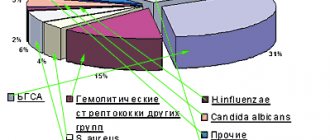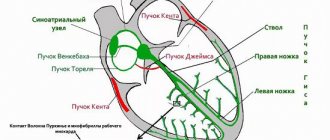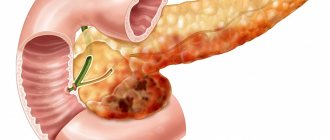How to treat chronic nasopharyngitis in children and adults
Rhinopharyngitis is an acute inflammatory process of the mucous membrane of the nose and the back wall of the pharynx.
Symptoms of acute nasopharyngitis: dry cough, nasal congestion, sore throat, copious discharge. In some cases, general weakness, headache, chills and sweating are noted. There are acute and chronic forms of pathology. The first is characterized by vivid symptoms and occurs suddenly. Chronic nasopharyngitis is a consequence of an untreated acute form with mild symptoms. Causes of the disease:
- viruses (adenovirus, rhinovirus, coronavirus, ECHO viruses);
- bacteria (streptococci, staphylococci, mycoplasma, chlamydia);
- irritants are the main cause of allergic rhinopharyngitis.
Predisposing factors are hypo- and vitamin deficiency, malnutrition, hypothermia, reduced immunity. The occurrence of the disease is facilitated by difficulty in nasal breathing, air pollution, and chronic diseases of the upper respiratory tract. The cause of viral nasopharyngitis during pregnancy is most often bacteria. The sources are carious teeth, sinusitis, rhinitis.
Causes of nasopharyngitis
Rhinopharyngitis is predominantly an infectious disease. In more than 80% of cases, especially in the autumn-winter period, it is caused by viruses - rhinovirus, adenoviruses, influenza viruses, etc. Bacterial nasopharyngitis occurs slightly less frequently. In this case, the causative agents of the disease are chlamydia, mycoplasma, streptococcus and staphylococcus.
Separately, we can distinguish allergic rhinopharyngitis, which develops under the influence of allergens that penetrate the upper respiratory tract - plant pollen, animal hair, tobacco smoke, household chemicals, etc.
Risk factors for developing a runny nose: hypothermia, weak immunity, the presence of chronic ENT diseases or pathologies of internal organs.
Types of inflammatory process
Acute nasopharyngitis begins suddenly. The main manifestations are dry mucous membranes, nasal congestion, sore throat, impaired sense of smell. The patient complains of profuse serous discharge from the nose. Without timely treatment, the discharge becomes purulent.
The chronic inflammatory process is a consequence of untreated acute rhinopharyngitis. The clinical manifestation of the disease will be a lack of sense of smell and difficulty in nasal breathing. Fever and cough with chronic rhinopharyngitis are usually absent.
The symptoms of the allergic form are in many ways similar to the manifestations of acute nasopharyngitis. Nasal congestion, swelling of the mucous membranes, soreness, serous discharge - the body’s reaction to an irritating substance.
General description of nasopharyngitis
Rhinopharyngitis (nasopharyngitis) - inflammation of the mucous membrane of the nasopharynx. It is a mild illness, most common in children aged six months to four years, but can also affect adults.
Rhinopharyngitis can be caused by more than 200 types of viruses, the most common are:
- rhinoviruses, which make up 30-80%;
- influenza viruses - 10-15%;
- adenovirus - 10-15%.
Nasopharyngitis caused by a rhinovirus is most contagious during the first three days after symptoms appear.
Most of these viruses are predominant in winter, but you can get nasopharyngitis at any time of the year.
And even if this is not a serious disease, it still needs to be treated correctly in order to get rid of it as soon as possible.
Rhinopharyngitis is mainly of viral origin, but can recur up to several times a year; in this case, it is necessary to look for an allergic cause: mites, pollen or animal dander.
Types of nasopharyngitis:
- catarrhal;
- atrophic;
- purulent;
- chronic;
- allergic;
- subatrophic rhinopharyngitis;
- rhinonasopharyngitis.
Factors that contribute to the development of nasopharyngitis include dry and damaged mucous membranes during cold periods, a suppressed immune system, stress, fatigue and an overall unhealthy lifestyle.
Symptoms and treatment of nasopharyngitis in children
The incubation period of the disease ranges from one to three days. However, the first signs make themselves felt already in the first day. If your child is capricious and refuses to eat, often sneezes and coughs, contact your pediatrician for help. After inspection
The doctor will write out a treatment regimen and give advice on caring for the baby. Timely treatment will help avoid many complications.
Clinical manifestations of acute nasopharyngitis:
- hoarseness and sore throat;
- copious whitish discharge from the nose;
- sneezing, watery eyes;
- elevated temperature;
- enlarged lymph nodes.
Treatment of nasopharyngitis in children consists of antiviral drugs, oil drops for instillation into the nose, antiseptic throat sprays and antihistamines. Inhalations for catarrhal nasopharyngitis in a child are recommended for thick nasal discharge and cough. The procedure is contraindicated at high temperatures and the presence of purulent discharge.
Complications:
- chronic nasopharyngitis;
- sinusitis, retropharyngeal abscess;
- otitis;
- bronchitis with an asthmatic component;
- pneumonia.
Children with weakened immune systems and the presence of chronic diseases are most susceptible to developing complications.
Treatment of runny nose, acute rhinitis
The main attention in the treatment of acute rhinitis (runny nose) should be focused on preventing the transition of the acute process to chronic rhinitis, preventing possible complications (sinuitis, otitis), eliminating the above etiological factors of the disease. In the first days of illness, at elevated temperatures, headaches, a patient with acute rhinitis (runny nose) is advised to rest in bed and stay in a warm room.
During this period, in the absence or severe difficulty of breathing through the nose, the following is prescribed:
- physiotherapy
- warming
- UV irradiation on the area of the soles (erythemal dose)
- mustard plasters on calves
- hot and (better) mustard foot baths
- herbal medicine
There is a widespread misconception that taking vitamin C for prophylactic purposes will prevent the flu or cold (acute rhinitis).
In the treatment of acute rhinitis (runny nose), vasoconstrictors are used: 1% boric acid solution (10 ml) with 0.1% adrenaline solution (10 drops), 3-6 drops in each half of the nose 3 times a day. Solutions of naphthyzine and sanorin (0.05% or 0.1%) are also prescribed, but their long-term use can cause swelling of the nasal mucosa and allergization. Incorrect instillation (with the head thrown back) is of no benefit, since the child immediately spits out the medicine or swallows it.
If there is a lot of mucus in the nasal cavity, it is first aspirated using a rubber balloon. The crusts that dry at the entrance to the nose are softened with sterile boiled oil (olive, sunflower), Vaseline or Oxycort and then carefully removed with a cotton wick.
In the treatment of acute rhinitis (runny nose), insufflation of antibiotic powder and sulfonamides into the nose is prescribed. For children under 3 years of age, the use of cocaine (due to its toxicity) and menthol (due to possible spasm of the glottis) is contraindicated. Physiotherapeutic procedures are used: solux, UHF currents, ozokerite.
In the case of acute rhinitis, the underlying disease is treated depending on its symptoms.
For older children with profuse watery discharge from the nose in the treatment of acute rhinitis (runny nose), sometimes to obtain a quick effect, you can prescribe belladonna tincture: 5 ml with valerian (10 ml) 10 drops up to 3 times a day or belloid in the form of dragees (up to 2 pieces per day). By lowering the tone of the parasympathetic nervous system and reducing the secretory function of the glands, these drugs contribute to regression of the inflammatory process and improvement of well-being.
It is not always necessary to recommend antipyretics (aspirin, etc.) at elevated temperatures, since they increase sweating, can predispose to various kinds of complications and worsen the course of the disease, reducing the body’s resistance to infectious aggression. The child’s nutrition should be limited to salt and liquid, be regular, nutritious, with a sufficient amount of vitamins.
Clinical manifestations in adults
The symptoms of the disease are in many ways similar to the manifestations of rhinitis and pharyngitis. The main symptoms of the viral form:
- dry mucous membranes;
- sore throat, nasal voice;
- viscous discharge;
- painful sensations in the ears;
- low-grade fever;
- enlarged cervical and occipital lymph nodes.
The allergic form of the pathology is characterized by nasal congestion, cough, swelling of the mucous membranes, and redness of the pharynx. On our website you will find more information, including which medications are most effective for atrophic nasopharyngitis.
How to treat chronic nasopharyngitis
The main goal of treatment is to eliminate the infection (viruses) and normalize nasal breathing. Drug therapy, physiotherapy and traditional medicine recipes will help to achieve this.
Antibiotics for nasopharyngitis in adults - amoxicillin, azithromycin, cefadroxil. In addition to therapy, there will be antiviral drugs, antiseptics, antihistamines and vasoconstrictor nasal drops for a short course. In severe cases of chronic disease, doctors recommend topical corticosteroids.
The patient is prescribed bed rest, plenty of fluids, easily digestible food and vitamin therapy. A good addition to drug treatment would be nasal rinsing, gargling with herbal decoctions, inhalations and physiotherapeutic procedures.
How to treat nasopharyngitis in infants? To rinse the nose, pediatricians recommend using saline solution and drops based on sea water. A small “pear” with a rubber tip will help remove mucus. During the consultation, the doctor will tell you in more detail about the features of treating children and tell you how to treat chronic nasopharyngitis.
Acute rhinitis (rhinopharyngitis)
Acute rhinitis (rhinopharyngitis) in newborns and infants develops due to the spread of the inflammatory process to the pharynx. The disease is severe. It is due to less adaptation than in adults to changes in the external environment, both due to the functional and morphological characteristics of the central nervous system, and due to tissue immaturity.
The nasal passages in newborns and infants are very narrow, and slight swelling of the mucous membrane leads to severe difficulty breathing. As a result, breathing through the nose is impaired and feeding becomes difficult, since when sucking the child is forced to periodically breathe through the mouth. During sleep, such children experience attacks of shortness of breath and suffocation, and due to the need for mouth breathing, deeper parts of the respiratory tract are affected (pneumonia). The cause of acute rhinitis in infants is most often a viral infection, but they have not yet developed the immune mechanisms to fight it, which determines the severity of the disease. The temperature sometimes rises to 40 °C.
The crusts that dry at the entrance to the nose are softened with sterile boiled oil (olive, sunflower), Vaseline or Oxycort and then carefully removed with a cotton wick.
Prevention
By following simple recommendations from doctors, you can avoid nasopharyngitis and its many complications.
Advice from an otolaryngologist:
- timely treatment of viral and infectious diseases;
- rational nutrition and drinking regime;
- preventive intake of vitamin-mineral complexes in the spring-autumn period;
- flu vaccination;
- use of oxolinic ointment in winter;
- compliance with personal hygiene rules;
- strengthening the immune system.
Related services: Pediatric otolaryngologist ENT combine
Complications of nasopharyngitis
The risk of complications increases without treatment or when the body cannot heal itself. On the one hand, viruses in the respiratory tract will multiply, infecting areas that are still healthy, and on the other hand, nasopharyngitis can pave the way for bacterial superinfections. Superinfection is when a viral infection sets the stage for a subsequent bacterial infection due to a weakened immune system. If your general health does not improve or your symptoms worsen, you should see your doctor as soon as possible.
Rhinopharyngitis rarely causes complications, but some people with weakened immune systems may experience a secondary bacterial infection in the form of:
- tonsillitis (inflammation of the tonsils of viral or bacterial origin);
- laryngopharyngitis;
- tracheitis (inflammation of the trachea, causing an irritating cough);
- bronchitis (inflammation of the bronchi, which usually manifests itself in the form of cough and difficulty breathing);
- sinusitis (inflammation of the sinuses associated with an infection of viral or bacterial origin);
- otitis (inflammation or infection of the ear);
In this case, consultation is necessary, as well as treatment with antibiotics if a bacterial infection is proven.
In children under 3 months of age, complications occur more often due to insufficient maturation of the immune system. Therefore, in this case, as in pregnant women, with constant fever, careful monitoring of the condition is necessary.






